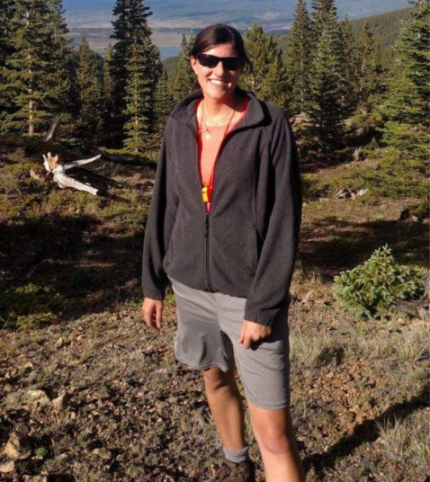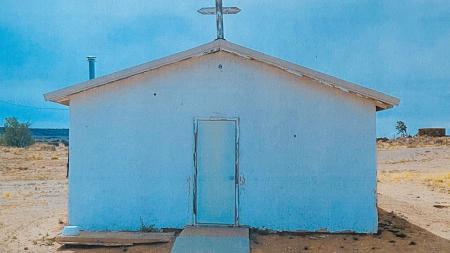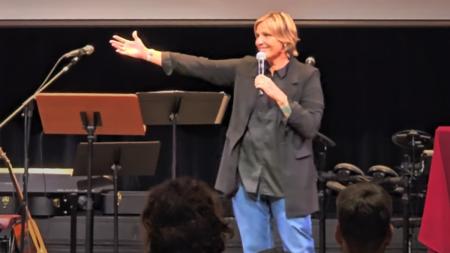Courtney’s Climb in Tanzania

Courtney Lanting
World Renew
Courtney Lanting had a difficult feat ahead of her as she climbed Mt. Kilimanjaro in Tanzania, but the Byron Center, Mich., woman made it to the 19,341-foot summit on Aug. 9.
Lanting, an intermediate hiker and climber, was part of a group that climbed to the top of the peak. She made the ascent for personal reasons but also to raise awareness of and funding for World Renew through Growing Hope Globally, a World Renew partner that raises funds from growing projects in North America to help subsistence farmers in Kenya and other areas of the world grow more food to feed their families.
“I wanted the climb to be about more than just me. . . . I did reach the peak, but not without difficulties. I was exhausted and started to get discouraged, but I kept praying and talking to God to give me the strength,” she said.
Kilimanjaro, the tallest and most recognizable mountain in Africa, takes hikers from rainforest to alpine desert to arctic snowcap. Climbers say that cresting Kilimanjaro is like walking from the equator to the North Pole in a week, providing dramatic changes in vegetation and animal life day by day.
“The first four days went well,” said Lanting. “I was physically in good shape, and my body acclimatized to the altitude. But on the night of the summit my doubts started to settle in.”
While she was climbing the last leg at night by headlamp, she said, the top seemed out of reach. “I kept looking up and seeing the tiny headlamps of other climbers ahead and thought ‘That’s how far I still need to go?! How am I ever going to make that?’”
But after a long seven-hour trek, slowly placing one foot in front of the other, she made it. “Definitely one of the best feelings I have ever encountered,” she said. “I was in tears.”
Lanting, a member of Friendship Christian Reformed Church in Byron Center, climbed Aug. 4–9. Though she had climbed mountains and hiked trails in the past, this proved to be the most challenging, she said.
When the opportunity came to climb Kilimanjaro, said Lanting, she decided to take on the task because of her love of being outdoors. And because her church supports World Renew and participates in a growing project for World Renew through Growing Hope Globally, which celebrates its 20th anniversary this year, she wanted to bring awareness and support to the ministry as well.
Lanting said she was also able to be a part of a Growing Hope effort in Guatemala two years ago.
“We helped communities build two greenhouses that each supported six families,” said Lanting. “It was a wonderful and eye-opening experience.”
Growing Hope’s community growing projects have raised more than $35 million since 1999 to support agricultural development programs in some of the most remote regions of the world.
Founded in 1999 as Foods Resource Bank, Growing Hope Globally started when “Ohio farmers Vernon and Carol Sloan invited their neighbors to become part of the solution to world hunger by sending corn from their fields to developing countries. They quickly learned that shipping corn was too costly – nearly 15 times the cost of the grain itself – and would wreak havoc on local farmers and markets,” according to the Growing Hope website.
To learn more, they met with World Renew and other Christian organizations that operate food security programs in countries worldwide. Growing Hope Globally decided to use the revenue from crops grown and sold in the U.S. to help fund agricultural development domestically and overseas through these Christian partners.
As a result, Growing Hope Globally now has about 170 Growing Projects in rural communities across the United States. Funds from these projects support demonstration farms and production centers in Nicaragua and India; training and strengthening agricultural cooperatives in Haiti; and training about drought-tolerant crops, fruit and medicinal trees, agroforestry, and bio-intensive farming in Kenya.
“[The programs we fund] are focused on providing agriculture training rather than material things,” said Rachel Conley, an associate regional director for Growing Hope Globally who is based in Holland, Mich.
“Material things eventually break or get used up, but helping people gain the knowledge to help themselves and provide for their families brings about lasting change. [Through our partners] we are able to provide the gifts of dignity, hope, and a legacy to pass down to future generations."
LaRaine Salmon, a Growing Project leader from Moline, Mich., said, “It hasn’t been possible for me to be a missionary overseas, but this allows me to serve right where I am and help others.”
To learn more about Growing Hope Globally, visit worldrenew.net/ghg.


